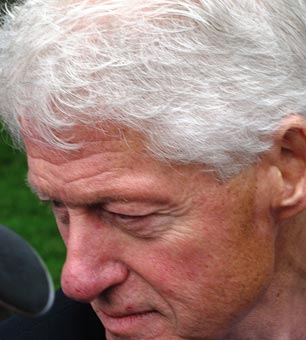 Bill Clinton. (Photo: WisPolitics.com / Flickr)I was on CNBC Tuesday when Bill Clinton gave an interview saying that, given the deadlock between Republicans and Democrats on Capitol Hill, it seemed likely the Bush tax cuts would be extended in 2013 along with all spending. When asked to comment, I said Clinton was probably correct.
Bill Clinton. (Photo: WisPolitics.com / Flickr)I was on CNBC Tuesday when Bill Clinton gave an interview saying that, given the deadlock between Republicans and Democrats on Capitol Hill, it seemed likely the Bush tax cuts would be extended in 2013 along with all spending. When asked to comment, I said Clinton was probably correct.
But, of course, Republicans have twisted Clinton’s words into a pretzel. They say the former president came out in favor of extending the Bush tax cuts to the wealthy – in sharp contrast to President Obama’s position that they should not be.
It’s typical election-year politics, except for the fact that the Republican megaphone is larger this time around due to all the Super PAC and secret “social welfare” organization bribes, er, donations that are filling Republican coffers.
Here’s the truth. America has a huge budget deficit hanging over our heads. If the rich don’t pay their fair share, the rest of us have to pay higher taxes — or do without vital public services like Medicare, Medicaid, Pell grants, food stamps, child nutrition, federal aid to education, and more.
Republicans say we shouldn’t raise taxes on the rich when the economy is still in the dumps. This is a variation on their old discredited trickle-down economic theories. The fact is, the rich already spend as much as they’re going to spend. Raising their taxes a bit won’t deter them from buying, and therefore won’t hurt the economy.
In reality, Romney and the GOP are pushing an agenda that has nothing whatever to do with reducing the budget deficit. If they were serious about deficit reduction they wouldn’t demand tax cuts for the very wealthy.
We should have learned by now. The Bush tax cuts of 2001 and 2003 were supposed to be temporary. Even so, they blew a huge hole in the budget deficit.
Millionaires received a tax cut that’s averaged $123,000 a year, while the median-wage worker’s tax cut has amounted to no more than a few hundreds dollars a year.
Bush promised the tax cuts would more than pay for themselves in terms of their alleged positive impact on the economy. The record shows they didn’t. Job growth after the Bush tax cuts was a fraction of the growth under Bill Clinton – even before the economy crashed in late 2008. And the median wage dropped, adjusted for inflation.
Let’s be clear. Romney and the Republicans are pushing a reverse-Robin Hood plan that takes from the middle class and the poor while rewarding the rich.
According to the nonpartisan Tax Policy Center, Romney’s tax plan would boost the incomes of people earning more than $1 million a year by an average of $295,874 annually.
Meanwhile, according to the Center on Budget and Policy Priorities, Romney’s plan would throw ten million low-income people off the benefits rolls for food stamps or cut benefits by thousands of dollars a year, or both. “These cuts would primarily affect very low-income families with children, seniors and people with disabilities,” the Center concludes.
The rich have to pay their fair share. Period.
What happens next?
Only a few days remain before the presidential election. To make sure we can continue our vital coverage before Tuesday, we’re asking for your support.
Truthout is funded overwhelmingly by readers like you. Your gift allows us to hold the political candidates accountable, delve into the nuance of complex issues, and stay wholly focused on seeking justice.
No matter what happens on November 5, your gift today ensures that there’s a place for independent journalism in the future – regardless of right-wing suppression, industry corporatization, and any other challenges we have yet to face. Please make a one-time or monthly donation to Truthout today.